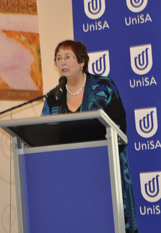Courts and Judges on trial by Media

Adelaide communications lecturer Dr Pamela Schulz outlines her thesis at the launching of her book Courts and Judges on Trial.
Judges have been the victims of “rougher than usual media treatment’’ through “screaming headlines’’ and sensationalist television footage of controversial judgements, says award-winning Adelaide communications expert Dr Pamela Schulz.
The University of South Australia lecturer cites an ancient quotation by
Cicero in 68BC “Alas my client is condemned by public opinion’’ to reflect .
her doctoral thesis that the media and the “politicisation’’ of the court processes and judgements have shaken public confidence in the judiciary.
She also claims in her provocative scholarly work that the independence of the judiciary may be at risk as politicians push the law and order issue to gain votes.
Her book Courts and Judges on Trial, was launched by former High Court judge, Justice Michael Kirby at the University of South Australia this week.
It is a powerful linguistic research analysis which critically analyses language and power surrounding media coverage and reporting of the courts and how it has had a negative impact on public opinion.
It reveals judges are subjected to a constant barrage of criticism through relentless “screaming headlines’’ and dramatic television footage, which casts doubt of the wisdom of judgements.
“I had started out on this long journey of scholarship to give judges a hard time because I believed judges were out of touch, but I discovered that I was wrong. If you constantly see headlines “Judges out of Touch’’, that they are too lenient, after a while you believe it.,’’ says Dr Schulz, who interviewed 15 judges, court reporters and court administrators for her thesis.
However, judges are unable to defend themselves, says Dr Schulz, who was the first communications manager for the Court Authority of SA.
She is highly critical of the courts media liaison system as well as the media’s court reporting and she calls for the re-enstatement of specialist court reporters.
“Tiny grabs from complex trials will be extracted to maximise shock, horror and outrage,’’ says Dr Schulz.
“It leads to increased distortion of news about the courts.’’
She lists provocative headlines such as “Outrage’’, “Premier orders DPP to Appeal’’ and “Only 8 Hours in Gaol’’.
“Alarmist headlines are often false and misleading,’’ she says. Such headlines flame the public who are “paralysed by fear or crime’’ and politicians use the law and order issue as a political football.
“Yet, we live in a relatively safe society,’’ she adds.
She suggests a far broader courts communications system is needed and believes a “press judge’’ should be appointed to explain complex judgments.
“I have suggested judges put their sentencing remarks directly on line by appearing on camera so people can see the summing up in context,’’ she says.
What concerns Dr Schulz most is that this “discourse of disapproval’’ leads to a “discourse of direction’’ whereby the justice system is directed to carry out the will of politicians in power.
“This may lead to the destruction of independence of the justice system.’’
However, judges also need to understand the media’s requirements: “Judges do need to include pithy summaries in their judgement statements,’’ she says.
Dr Schulz’s book, which is for sale from Unibooks and www.amazon.co.uk, has received accolades from judges in Europe, New Zealand and the United States.
Dr Schulz has had an eclectic career moving from her former days as radio journalist to renowned public servant, to academic and now to published author.



